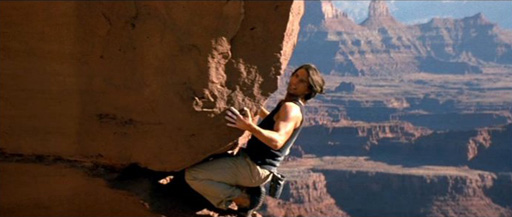|
|
Chapter Two - Mission: Impossible IIBy Brett BeachMarch 3, 2011
Somehow Brian DePalma and J.J. Abrams sidestepped this fate. DePalma’s take, my personal favorite, is very much his own beast — until that shoehorned-in bullet train/helicopter climax — and the air of 1970s paranoia and governmental mistrust that pervades the story and Hunt’s pursuit of the truth, feels like DePalma in Blow Out mode. The defining image, Hunt breaking in to the CIA from above to enter a secure computer room and upload a file in utter silence while dangling from a wire, is perversely thrilling and completely antithetical to the normal visceral charge of a big summer action set piece. To a lesser extent, this is true of the conversation between Hunt and one of his superiors (played with steely resolve by Henry Czerny) at a restaurant that climaxes with a literal bang and the endlessly quotable line from Hunt, “You’ve never seen me very upset.” J.J. Abrams’ take on Mission: Impossible has been the best received from a critical standpoint and finds favor among many of the staffers here at BOP. Philip Seymour Hoffman certainly embodies a more boo-worthy and ruthless villain than Dougray Scott or Jon Voight is able to. Abrams finds his preferred balance charting the conflicts between the equally worthy yet stress-inducing travails of his protagonists in their personal and professional spheres, and stirs the pot with a requisite amount of double-crosses and game-changing plot twists. If it on occasion feels like a missing arc in one of the final seasons of Alias, Abrams pulls off the neat trick of keeping the ridiculous spy elements at a light summer action simmer while his characters' emotions are allowed to bubble over.
|

|
|
|

|
Friday, November 1, 2024
© 2024 Box Office Prophets, a division of One Of Us, Inc.


